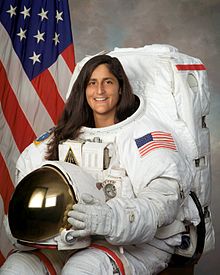
“I am really looking forward to India’s participation in space programmes in a big way. A space programme requires a lot of creativity and imagination. Follow your dreams to realise your creative potential,” she said while addressing about 300 students from various Mumbai schools.
She said the international space station was a collaborative venture between several countries. “It is a collaborative venture, where different countries are actively participating. It has brought the world together.”
Expressing happiness over the collaboration between Indian Space Research Organisation (ISRO) and National Aeronautics and Space Administration (NASA), Williams said it would open up several opportunities for young Indians interested in pursuing career in space exploration.
She made a video presentation on her latest space expedition — Expedition 33, which was launched from Baikonur Cosmodrome in Kazakhstan July 15, 2012.
The Indian-origin astronaut, who holds the record for longest space walk by a woman at 50 hours 40 minutes, also narrated her experience of space travel.
“While in space, we see 16 sunrises and 16 sunsets in a span of 24 hours. Naturally, you cannot wake up every time the sun rises and go to sleep once it is dark. We set our day to the GMT (Greenwich Mean Time).
“We wake up around 6 a.m. and do pretty much the same things we do at home,” she said while giving a rundown of a regular day in space.
“The work hours are between 8 a.m.-7 p.m. GMT when the Command Centre on the Earth, gives us assignments for the day,” she said.
“In the beginning, it all looks very clumsy but soon you learn to float around smoothly and get accustomed to living without gravity,” she added.
She said that she would love to talk more and more about her space mission, thereby getting more people interested in pursuing a career in space exploration.
When asked as to how the expenditure on space mission can be justified when there is severe poverty in the world, Williams said that technology used in the space is innovative and can also be used on earth to facilitate better living.
“For example, we use a miniature device for blood testing at the space station. A device like this can easily be used at mobile hospitals where funding for something like this might not be easily available,” she said.
The opinions, beliefs and viewpoints expressed by authors, news service providers on this page do not necessarily reflect the opinions, beliefs and viewpoints of Hill Post. Any views or opinions are not intended to malign any religion, ethnic group, club, organization, company, or individual.
Hill Post makes no representations as to the accuracy or completeness of any information on this site page.


